
A month’s worth of food for a family of five now costs more than three times Lebanon’s minimum wage. (Credit: Céline Abboud)
Want to get the Morning Brief by email? Click here to sign up.
A month’s worth of main meals for a family of five now costs more than three times Lebanon’s minimum wage. The finding, from a report by the American University of Beirut’s Crisis Observatory, comes as the national currency continues to trade above LL17,500 to the US dollar on the parallel market — representing a loss of more than 90 percent in value since mid-2019. Rapid inflation means that supplying main meals for a month for a family of five now costs about LL2.1 million, while the country’s minimum wage has remained LL675,000. The prices of certain food products have soared — the cost of sunflower oil rose 1,100 percent since summer 2019 and that of rice went up by 545 percent — putting them out of reach for many families. Last week, UNICEF estimated that 30 percent of children in Lebanon now go to bed on an empty stomach.
Transport workers are seeking to secure targeted state support amid rising fuel costs. Bassam Tleis, who heads the land transport unions, told L’Orient Today he will meet caretaker Premier Hassan Diab on Tuesday to ask that drivers receive monthly ration cards worth LL500,000, as well as money to pay for fuel. Union members decided to postpone a strike and “day of action” against subsidy cuts scheduled for Wednesday while they await the outcome of today’s meeting. Gas prices were hiked twice last week after fuel subsidies were partially ended, translating to a more than 50 percent increase at the pumps and further burdening motorists, who are already struggling to fill up their tanks due to lengthy queues and rationing at gas stations.
MPs and Ogero are seeking extra funds to keep Lebanon’s internet and telecoms services operational. Following a meeting of Parliament's Media and Communications Committee, MP Hussein Hajj Hassan announced that the state telecommunications company, Ogero, would draw up a draft law for extrabudgetary funding that would keep its generators and stations online. Since the start of 2021, Ogero has spent LL58 billion on fuel to run backup generators, Hajj Hassan said — LL10 billion more than its operating budget for the entire year. Malfunctioning generators and fuel shortages have caused sporadic internet outages across the country over the past few months, while Ogero’s director has warned that a lack of spare parts is reaching a “critical” point.
The central bank has agreed to pay for imports of gas oil to keep the Deir Ammar and Zahrani power plants running, averting their imminent shutdown. As of yesterday afternoon, Banque du Liban was in the process of approving a $30 million letter of credit to import the fuel, sources told L’Orient-Le Jour, temporarily staving off further power cuts. On Friday, the state power utility, Électricité du Liban, had warned that it would have to switch off the two plants if its waning reserves of gas oil ran out. Meanwhile, hospital representatives are set to meet with Energy Ministry officials today to find a solution to ongoing fuel shortages that are threatening their facilities’ ability to operate, the head of the private hospitals’ syndicate, Sleiman Haroun, told L’Orient Today.
BDL’s governor Riad Salameh said he would begin paying invoices for wheat and essential medication imports, up to a maximum of $400 million. Drug shortages have persisted for months, despite previous pledges by the central bank that it would settle payments to overseas suppliers. The pharmaceutical importers’ syndicate warned on Sunday that stocks would be empty by the end of July, accusing BDL of failing to settle more than $600 million in bills dating back to December. A BDL spokesperson told L’Orient Today that no precise time frame could be given for the payments, but that bills would be settled “very soon.”
Eight beaches across Lebanon are “heavily polluted” and unsafe to swim at, the National Council for Scientific Research has found. The coastal waters at testing sites in Mina, Tripoli public beach, Jounieh public beach, the Dbayeh port, the mouth of Nahr al-Kalb, Beirut’s Manara and Ramlet al-Baida were found to contain unhealthy amounts of coliform and streptococci bacteria, while the public beach in Selaata is polluted by dangerous chemicals. Twenty-six other beaches were found to be safe, including in Naqoura, Anfeh and Sur, which were among the cleanest sites. Swimming at four other areas is “borderline to critically unsafe.”
The Education Ministry canceled this summer’s Grade 9 brevet and technical exams. The exams, due to start next week, were canceled due to the COVID-19 pandemic and Lebanon’s deteriorating economic situation, prompting student groups to call off a protest planned for today. However, the baccalaureate exams taken by Grade 12 students to graduate high school and go on to further study will go ahead. Save the Children estimated earlier this year that COVID-19 school closures and the deepening economic crisis have caused more than 1 million children in Lebanon to miss out on a proper education.
Hezbollah Secretary-General Hassan Nasrallah accused the United States of blocking aid to Lebanon from eastern nations. In a speech opening a conference on the role of the media in resisting the Israeli occupation of Palestine, Nasrallah said the US administration and threats of US sanctions on Lebanon were ruining opportunities for Lebanon to garner support from countries like Russia and China. In two previous public addresses, the Hezbollah leader had suggested importing Iranian oil as a solution to Lebanon’s ongoing fuel crisis, claiming that the party was finalizing logistical preparations.
